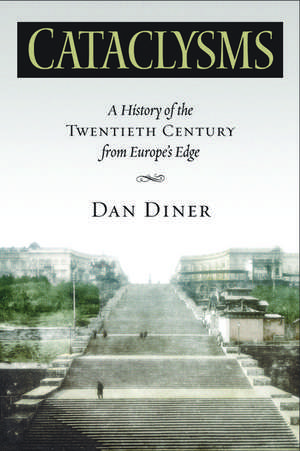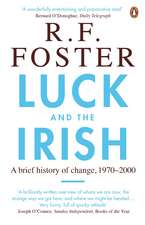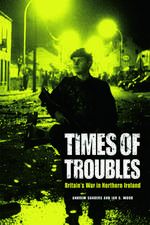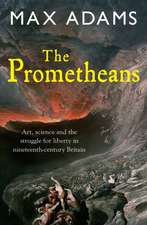Cataclysms: A History of the Twentieth Century from Europe’s Edge: George L. Mosse Series in the History of European Culture, Sexuality, and Ideas
Autor Dan Diner Traducere de William Templer, Joel Golben Limba Engleză Hardback – 20 noi 2007
Cataclysms is a profoundly original look at the last century. Approaching twentieth-century history from the periphery rather than the centers of decision-making, the virtual narrator sits perched on the legendary stairs of Odessa and watches as events between the Baltic and the Aegean pass in review, unfolding in space and time between 1917 and 1989, while evoking the nineteenth century as an interpretative backdrop.
Influenced by continental historical, legal, and social thought, Dan Diner views the totality of world history evolving from an Eastern and Southeastern European angle. A work of great synthesis, Cataclysms chronicles twentieth century history as a “universal civil war” between a succession of conflicting dualisms such as freedom and equality, race and class, capitalism and communism, liberalism and fascism, East and West.
Diner’s interpretation rotates around cataclysmic events in the transformation from multinational empires into nation states, accompanied by social revolution and “ethnic cleansing,” situating the Holocaust at the core of the century’s predicament. Unlike other Eurocentric interpretations of the last century, Diner also highlights the emerging pivotal importance of the United States and the impact of decolonization on the process of European integration.
Influenced by continental historical, legal, and social thought, Dan Diner views the totality of world history evolving from an Eastern and Southeastern European angle. A work of great synthesis, Cataclysms chronicles twentieth century history as a “universal civil war” between a succession of conflicting dualisms such as freedom and equality, race and class, capitalism and communism, liberalism and fascism, East and West.
Diner’s interpretation rotates around cataclysmic events in the transformation from multinational empires into nation states, accompanied by social revolution and “ethnic cleansing,” situating the Holocaust at the core of the century’s predicament. Unlike other Eurocentric interpretations of the last century, Diner also highlights the emerging pivotal importance of the United States and the impact of decolonization on the process of European integration.
Din seria George L. Mosse Series in the History of European Culture, Sexuality, and Ideas
-
 Preț: 119.08 lei
Preț: 119.08 lei -
 Preț: 166.01 lei
Preț: 166.01 lei -
 Preț: 338.36 lei
Preț: 338.36 lei -
 Preț: 144.97 lei
Preț: 144.97 lei -
 Preț: 143.79 lei
Preț: 143.79 lei - 19%
 Preț: 433.43 lei
Preț: 433.43 lei - 19%
 Preț: 432.54 lei
Preț: 432.54 lei -
 Preț: 263.72 lei
Preț: 263.72 lei -
 Preț: 297.44 lei
Preț: 297.44 lei -
 Preț: 154.26 lei
Preț: 154.26 lei -
 Preț: 245.82 lei
Preț: 245.82 lei -
 Preț: 231.53 lei
Preț: 231.53 lei -
 Preț: 250.82 lei
Preț: 250.82 lei -
 Preț: 246.19 lei
Preț: 246.19 lei -
 Preț: 306.34 lei
Preț: 306.34 lei -
 Preț: 305.89 lei
Preț: 305.89 lei -
 Preț: 132.03 lei
Preț: 132.03 lei -
 Preț: 279.45 lei
Preț: 279.45 lei -
 Preț: 181.22 lei
Preț: 181.22 lei -
 Preț: 189.95 lei
Preț: 189.95 lei -
 Preț: 251.23 lei
Preț: 251.23 lei -
 Preț: 190.51 lei
Preț: 190.51 lei -
 Preț: 315.95 lei
Preț: 315.95 lei - 23%
 Preț: 475.36 lei
Preț: 475.36 lei -
 Preț: 314.03 lei
Preț: 314.03 lei - 23%
 Preț: 482.44 lei
Preț: 482.44 lei - 8%
 Preț: 462.20 lei
Preț: 462.20 lei - 23%
 Preț: 482.60 lei
Preț: 482.60 lei -

Preț: 282.91 lei
Nou
Puncte Express: 424
Preț estimativ în valută:
54.13€ • 56.67$ • 44.79£
54.13€ • 56.67$ • 44.79£
Carte tipărită la comandă
Livrare economică 05-19 aprilie
Preluare comenzi: 021 569.72.76
Specificații
ISBN-13: 9780299223502
ISBN-10: 0299223507
Pagini: 336
Dimensiuni: 152 x 229 x 25 mm
Greutate: 0.58 kg
Editura: University of Wisconsin Press
Colecția University of Wisconsin Press
Seria George L. Mosse Series in the History of European Culture, Sexuality, and Ideas
ISBN-10: 0299223507
Pagini: 336
Dimensiuni: 152 x 229 x 25 mm
Greutate: 0.58 kg
Editura: University of Wisconsin Press
Colecția University of Wisconsin Press
Seria George L. Mosse Series in the History of European Culture, Sexuality, and Ideas
Recenzii
“Dan Diner’s intriguing and learned forays into the destructiveness of modern European history should attract a wide readership. This fast paced interpretative study of the axis of national and civil strife over the course of the twentieth century shows again why he is considered one of the continent’s most respected and interesting historians.”— Norman M. Naimark, Stanford University
“Diner, an enticingly unorthodox and persuasive historian, felicitously shuttles back and forth between philosophic-speculative analysis and a well-informed account of individual actors and events. An important work.”—Fritz Stern, author of Five Germanys I Have Known
Notă biografică
Dan Diner is Professor of Modern European History at the Hebrew University of Jerusalem and director of the Simon Dubnow Institute for Jewish History and Culture at Leipzig University.
Descriere
Cataclysms is a profoundly original look at the last century. Approaching twentieth-century history from the periphery rather than the centers of decision-making, the virtual narrator sits perched on the legendary stairs of Odessa and watches as events between the Baltic and the Aegean pass in review, unfolding in space and time between 1917 and 1989, while evoking the nineteenth century as an interpretative backdrop.
Influenced by continental historical, legal, and social thought, Dan Diner views the totality of world history evolving from an Eastern and Southeastern European angle. A work of great synthesis, Cataclysms chronicles twentieth century history as a “universal civil war” between a succession of conflicting dualisms such as freedom and equality, race and class, capitalism and communism, liberalism and fascism, East and West.
Diner’s interpretation rotates around cataclysmic events in the transformation from multinational empires into nation states, accompanied by social revolution and “ethnic cleansing,” situating the Holocaust at the core of the century’s predicament. Unlike other Eurocentric interpretations of the last century, Diner also highlights the emerging pivotal importance of the United States and the impact of decolonization on the process of European integration.
Influenced by continental historical, legal, and social thought, Dan Diner views the totality of world history evolving from an Eastern and Southeastern European angle. A work of great synthesis, Cataclysms chronicles twentieth century history as a “universal civil war” between a succession of conflicting dualisms such as freedom and equality, race and class, capitalism and communism, liberalism and fascism, East and West.
Diner’s interpretation rotates around cataclysmic events in the transformation from multinational empires into nation states, accompanied by social revolution and “ethnic cleansing,” situating the Holocaust at the core of the century’s predicament. Unlike other Eurocentric interpretations of the last century, Diner also highlights the emerging pivotal importance of the United States and the impact of decolonization on the process of European integration.














